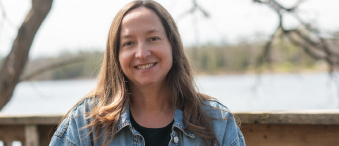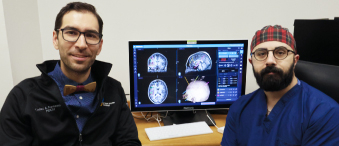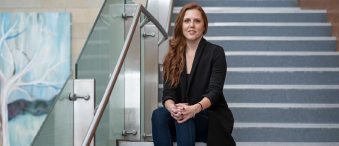A CANCER JOURNEY
Diagnosis of Hodgkin’s lymphoma stops Heba Haidar in her tracks
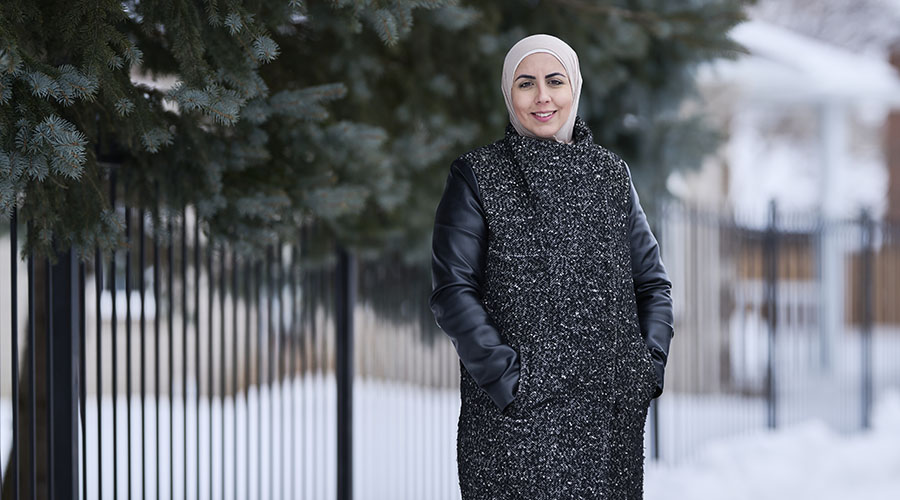
Published: February 2024
At age 33, and with three children under the age of five, Heba Haidar was making big plans in the spring of 2022. She and her husband were planning an eight-week trip back to Lebanon to see their family — it would be the first visit since before the pandemic. Two of her three children would meet their grandparents for the first time. But everything came to a grinding halt when Heba learned she had Hodgkin’s lymphoma.
The first red flag came when Heba noticed random swelling in her neck. Her doctor ordered an ultrasound, and the results were inconclusive. The swelling went away on its own. “My doctor suggested I see an ear, nose, and throat (ENT) specialist at The Ottawa Hospital,” explains Heba. “Not long after I got that referral, I noticed a lump in my neck below my collarbone, but I had no other symptoms.”
Five days before the family’s long-awaited trip, Heba met with the ENT specialist who ordered a biopsy. The results would be available in five to seven days — by that time, Heba and her family would be in Lebanon.
“I left it to fate. I decided we’d still go on the trip, but the day before we were supposed to leave, I got the call,” remembers Heba. “My ENT doctor gave me the news over the phone knowing I was leaving. The results showed a malignancy, but not enough to give me a diagnosis.”
Diagnosis of Hodgkin’s lymphoma flips world upside down
Suddenly, Heba’s life was flipped upside down. “There was panic. I was in complete shock.”
“There’s no road map to navigate this news. The first thing we did was unpack for our trip.”
— Heba Haidar
Then, with the trip cancelled, Heba was thrust into a series of appointments, including tests and scans to pinpoint the diagnosis. At the time, she was on maternity leave as manager of a medical clinic — she was nursing her nine-month-old and caring for her other two children who were four and five years old. They all relied on her 24/7.
Just two weeks after she was supposed to leave on her trip, Heba was diagnosed with Hodgkin’s lymphoma and referred to the hematology team at The Ottawa Hospital where next steps were discussed and the roadmap for treatment put in place.
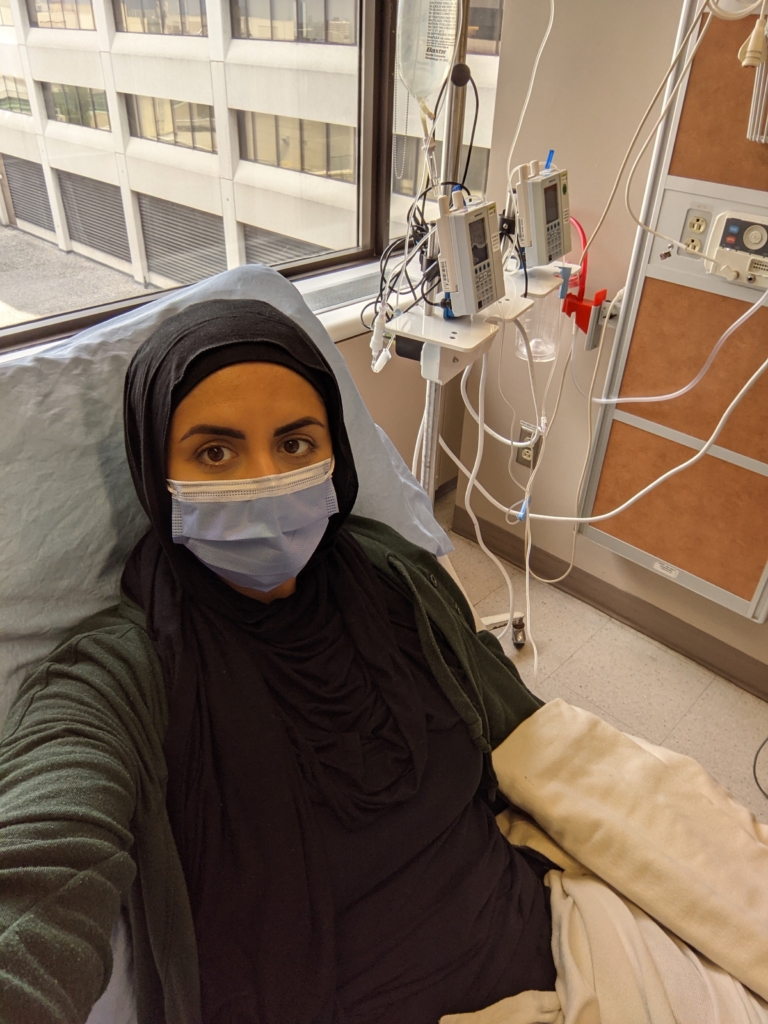
“That period from diagnosis to treatment plan is probably the worst period a patient can go through because everything is unknown, and your mind goes wild — wondering what’s going to happen,” says Heba.
Both Hodgkin’s lymphoma and non-Hodgkin’s lymphoma form in the white blood cells. Those cells are called lymphocytes, and they are an important part of the body’s germ-fighting immune system. The difference between the two can only be seen under a microscope and depends on whether a particular type of cell called Reed-Sternberg is detected. If it is, then the lymphoma is classified as Hodgkin’s. If it’s not, then it’s diagnosed non-Hodgkin’s lymphoma. Hodgkin’s lymphoma is generally diagnosed at an earlier stage.
Six months of chemotherapy with three young children at home
Since Heba’s cancer was stage 2, her hematologist, Dr. Melissa Toupin, started her on four to six months of chemotherapy starting in mid-June. A scan in early August 2022 showed she was in remission. However, Dr. Toupin recommended she continue with a full six months of chemo to give her the best possible chance to avoid a recurrence.
Heba described every round of chemo as a challenge. “Something that was just foreign to me two months ago was now a regular part of my life. It took me some time to come to terms with the extension of treatment, but knowing my scans were clear, it helped.”
She also turned to our psycho-social oncology program for support. She did several sessions to help with the mental side of the cancer treatment. Over the next few months, she stayed active by walking, weightlifting at home, and of course, being a mom didn’t stop.
Then on November 16, 2022, Heba rang the bell, signifying her final treatment. She described the moment as surreal and amazing. “It was kind of like a double-edged sword. There was relief, but then there was the whole realization of what I just went through,” remembers Heba. “I was in survival mode and then just like that, treatment was done. There was also that safety net when I was going to the hospital regularly. Now the safety net was removed. I worried about recurrence and what would happen to me.”
Desire to give back and support groundbreaking research
During her treatment, Heba was reflecting on the hospital’s care team that surrounded her, and she wanted to give back. She started a fundraiser with a goal of $10,000 to support cancer research at The Ottawa Hospital. “I wanted to raise awareness for the work The Ottawa Hospital is doing.”
“We have groundbreaking research right here in Canada, right here in Ottawa, and I wanted people to know about that.”
— Heba Haidar
Today, Heba is doing well and in a good place. That special trip back home finally happened in May 2023. In the midst of her treatment, it was hard to imagine the trip, but she remembers what a nurse said one day. “She said by next year, it will all feel like a bad dream.”
It also gave her a whole new perspective on life and the hospital. “At 33, I didn’t think about The Ottawa Hospital other than giving birth to my son. Even with my background in healthcare, my thoughts of the hospital were about having babies – happy thoughts. But now I think of the team and the compassionate people. They saved my life. They save lives and prolong lives.”
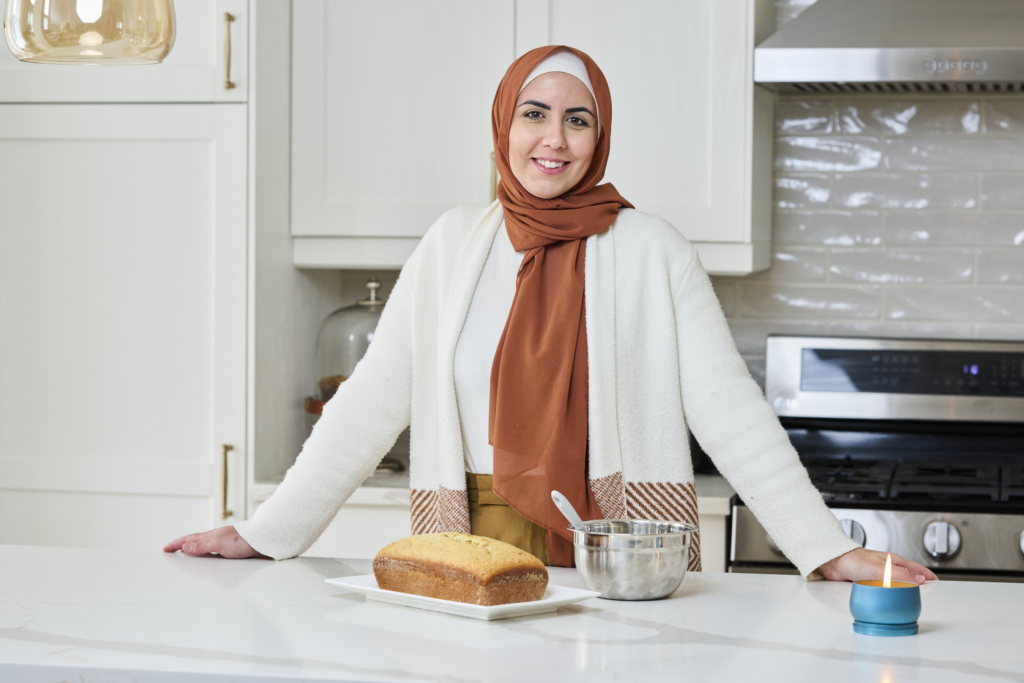
The Ottawa Hospital is a leading academic health, research, and learning hospital proudly affiliated with the University of Ottawa.


